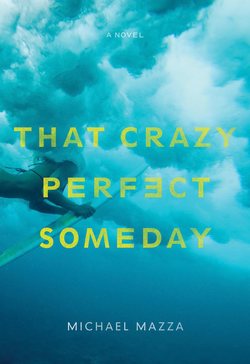Читать книгу That Crazy Perfect Someday - Michael Mazza - Страница 10
На сайте Литреса книга снята с продажи.
Оглавление3
Wednesday, 11:15 a.m.
I’m slumped on an overstuffed sofa across from Dr. Ruttonjee, the Veterans Affairs psychiatrist who’s been treating Daddy since his retirement. I wait awkwardly as he reaches over to his desk from his Danish-modern recliner for a prescription pad. Daddy’s been out in the waiting room since Dr. Ruttonjee asked to speak to me in private, and I know he’s probably annoyed that all the doctor has are cooking magazines and some high-tone New Yorker–style weeklies on display.
My eyes tick around his office at volumes of psychiatric books stacked high on his desk, myriad degrees on the wall, the intricate Oriental rug, and an abstract painting with dark black slashes that seems to be the focal point of the room. One thing that piques my curiosity is the Zulu warrior woodcarving on the back bookshelf. It’s about a foot tall, spear and shield in hand, with a very long ding-dong—you tell me.
Dr. Ruttonjee finds the pad, crosses his legs, and slaps the pad onto his lap. He’s an elderly man, a yogi type with a turban the color of Bisbee turquoise. He strums his long gray beard like he’s pondering something; Daddy’s dosage, I suppose. Then he pulls a pen from the pocket of his white short-sleeved dress shirt.
“Your father is presently on ten milligrams of Lexapro and 150 of Wellbutrin,” he says, his face long and meditative. “I’m going to up the dosage—not a great amount—but we’ll see if we can keep him from another episode like the other night’s.”
He scribbles out a prescription, tears it off, and hands it to me. I stare at it, expecting to see undecipherable chicken scratch, but it’s written in a beautiful cursive, his signature almost artistic.
Then he writes another prescription, but I can’t figure out what for.
“Here,” he says, handing it to me. “This is a prescription for Clozapine, an antipsychotic. If he goes into a catatonic state, give him one pill once a day in the morning. Only use it if you have to until we get him back in a relatively normal mood.”
“Antipsychotic?”
“We must remember that your father’s feelings of worthlessness and despair stem from his lack of purpose. His transition from a major military figure to civilian life, the added tragedy of your mother’s death, and the sinking of his beloved ship have created a great void in him.”
“He wants to see the carrier sink. Is that even a good idea?”
“Perhaps, if he’s there with his comrades to reminisce. It’s a funeral of sorts, and the grieving may be cathartic for him. Then again, it could be devastating if he’s not stable. I’d suggest he go only if he’s on solid ground and you accompany him.”
“I’m supposed to be in Sydney for training on Monday for three weeks and then Paris for the Olympics in a month and a half.”
“Congratulations, by the way.”
“Thanks, but I’m already worried that he won’t take his meds if I’m not around to nag him. I mean, he’s erratic about it, taking them in the afternoon instead of the morning, missing them on some days.”
“The ideal solution for tracking your father’s condition is to insert a biochip just under the skin of his wrist to accurately read his serotonin levels, but I don’t believe he’d tolerate the idea. I’d suggest an older technology, if he’s amenable. Have you considered a bio-band? It slips over his wrist and records his biometrics—and, more important, his general mood. You can monitor the data on your mobile, geotrack him 24/7—nothing extraordinary. There’s a chip in the prescription bottle, however, that records if, when, and how many pills he takes.”
He reaches around, retrieves Daddy’s patient file off his desk, and studies it a beat.
“Sorry, but his government health plan doesn’t cover it.”
“I’m into it,” I say, showing off my bio-band.
“Good. So you’re agreeable?”
“Affirmative.”
“How about your father?”
“Oh, he’ll hate it. But I’ll try anything at this point. It’s been two years of this crazy stuff, and I’m not sure how much more I can take. Let me work my magic.”
Daddy’s called back in, and I’m grateful he combed his hair and took a shower and shaved this morning because he goes three or four days sometimes, not giving a crap, looking like a complete drifter and smelling rather ripe, especially when you consider his boxing workouts. But he’s presentable today in jeans and flip-flops and a fresh white tee. He plops down on the sofa next to me. I feel a little puffy lift under my butt.
Dr. Ruttonjee explains.
Daddy reacts.
“I’m not a dog, for Christ’s sake.”
“Daddy, it’s a wristband, not a collar. It’s nothing new. The technology’s been around for over a decade. Like this,” I say, displaying mine. “You’re acting like it’s some experimental CIA homing device or something.”
“It’s made with hypoallergenic TPU rubber,” the doctor adds. “It’s so light, you’ll forget you’re wearing it.”
“I know what it is. Don’t patronize me.”
“So you’ll try it?” the doctor asks.
Daddy eyes us as if we’re coconspirators.
“For me?” I ask, gingerly. “Your one and only Olympic hopeful?”
“Fine,” he says, dropping back on the sofa. “For you.”
